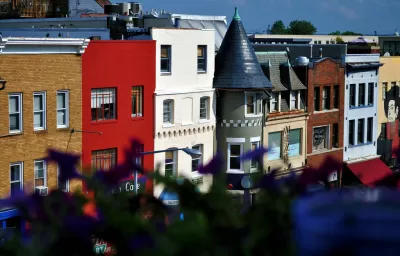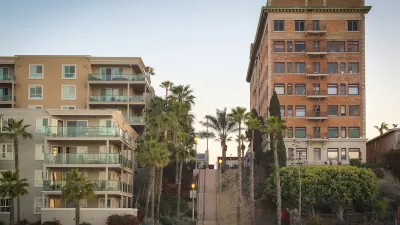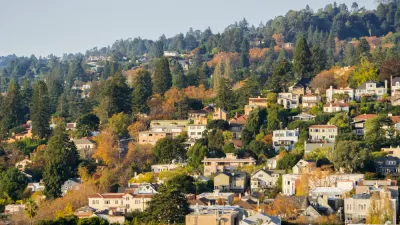The parallel crises of pollution and housing affordability require denser zoning of land uses, otherwise known as upzoning, according to this article.

Alex Baca writes for Greater Greater Washington to capture the current trend in upzoning, defined here as "changing zoning laws to make legal taller and/or denser buildings," as pursued by cities (Minneapolis and Seattle) and states (Oregon and California) as a way to address high housing costs.
After setting the context, Baca asks the key question: Why upzoning? The answer: on most of the land in the country, "all you can build is a single-family home, typically on a large lot." The Washington, D.C. region provides a perfect example of that kind of land use choice, according to Baca: "72% of our region is zoned single-family (this includes the Montgomery County Agricultural Reserve), while 42% of DC alone is zoned single-family."
The reason to reverse the dominant trend in the country, according to Baca is twofold: housing affordability and the environmental impact of sprawling land use patterns.
Neither of these parallel crises is helped by the fact that the only thing you can usually build in most American cities is a single-family home, which is on average more expensive than a home in a multiplex, and far worse for the environment. By preventing multifamily homes outright, single-family zoning dramatically curtails the construction of more, smaller homes. Apartment living might not be for everyone, but it shouldn’t be off-limits to build the kinds of neighborhoods we say we love.
FULL STORY: Why’s everyone talking about upzoning? It’s the foundation of green, equitable cities.

Planetizen Federal Action Tracker
A weekly monitor of how Trump’s orders and actions are impacting planners and planning in America.

Map: Where Senate Republicans Want to Sell Your Public Lands
For public land advocates, the Senate Republicans’ proposal to sell millions of acres of public land in the West is “the biggest fight of their careers.”

Restaurant Patios Were a Pandemic Win — Why Were They so Hard to Keep?
Social distancing requirements and changes in travel patterns prompted cities to pilot new uses for street and sidewalk space. Then it got complicated.

Platform Pilsner: Vancouver Transit Agency Releases... a Beer?
TransLink will receive a portion of every sale of the four-pack.

Toronto Weighs Cheaper Transit, Parking Hikes for Major Events
Special event rates would take effect during large festivals, sports games and concerts to ‘discourage driving, manage congestion and free up space for transit.”

Berlin to Consider Car-Free Zone Larger Than Manhattan
The area bound by the 22-mile Ringbahn would still allow 12 uses of a private automobile per year per person, and several other exemptions.
Urban Design for Planners 1: Software Tools
This six-course series explores essential urban design concepts using open source software and equips planners with the tools they need to participate fully in the urban design process.
Planning for Universal Design
Learn the tools for implementing Universal Design in planning regulations.
Heyer Gruel & Associates PA
JM Goldson LLC
Custer County Colorado
City of Camden Redevelopment Agency
City of Astoria
Transportation Research & Education Center (TREC) at Portland State University
Camden Redevelopment Agency
City of Claremont
Municipality of Princeton (NJ)





























